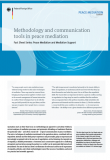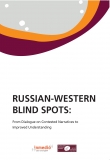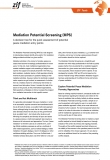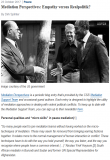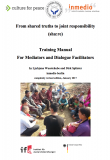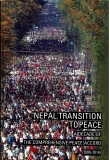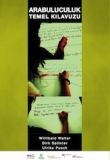Publications
Fact Sheet: Methodology and Communication Tools in Peace Mediation
The Initiative Mediation Support Deutschland (IMSD) - consisting of th Berghof Foundation, the Center for Peacemediation CPM, CSSP - Berlin Center for Integrative Mediation and inmedio - and the Federal Foreign Office have jointly developed a series of fact sheets on peace mediation and mediation support.
- Basics of mediation: concepts and definitions
- The role and contributions of states in peace mediation
- The role and contributions of multilateral and non-state actors in peace mediation
- Conflict analysis and mediation entry points
- The normative framework and the international legal basis of peace mediation
- Methodology and communication tools in peace mediation
Blind Spots in Russian-Western Narratives on European Security
How can we get from contested narratives on the evolution of European Security after 1989 to improved understanding within the OSCE? A Russian-German dialogue project discussed this difficult question at two workshops in Moscow and Berlin. The 20 participants managed to find consensus on a jointly drafted report. Innovatively, the project focused on so-called „blind spots”– events that figure prominently in the narrative of one side, but are overlooked or neglected in the narrative of the other side.
Russian-Western Blind Spots: From Dialogue on Contested Narratives to Improved Understanding
Results of the Dialogue Group's work in the German-Russian Project 'Russia and ‘the West’: Towards a better understanding of what went wrong since the end of the cold war: Joint Analysis of Conflict Narratives and Exploration of Metanarratives' which was funded by the Federal Foreign Office and implemented in 2018.
Mapping: Russian-Western Blind Spots
Graphic Representation of the Dialogue Group's work in the German-Russian Project 'Russia and ‘the West’: Towards a better understanding of what went wrong since the end of the cold war: Joint Analysis of Conflict Narratives and Exploration of Metanarratives' which was funded by the Federal Foreign Office and implemented in 2018.
Mediation Potential Screening
Developed by inmedio in cooperation with ZIF and CSSP, the mediation potential screening is a decision tree for the quick assessment of
peace mediation entry points and a 'differential diagnosis' of which format of mediation/ mediation-support or mediation-related dialogue is indicated, based on a conflict and context analysis and the potential and limitations of the third party.
Mediation Perspectives: Empathy versus Realpolitik?
From shared truths to joint responsibility. Training Manual for Mediators and Dialogue Facilitators. Berlin/Kathmandu, 2017.
This manual has been developed to enable the wider distribution of the sha:re approach of dialogue facilitation within the Nepali society. It is designed for Nepali trainers who are supposed to train facilitators ans mediators using this approach. However, it is not restricted to the Nepali context. We hope that this manual can inspire dedicated people in different parts of the world who assist peaceful settlements of conflicts and support reconciliation within societies. We would be more than happy, if this contributes even in a small way to reducing resentment and mistrust, rooted in the past, in different ethnic, social and religious backgrounds or gender.
This is a practical manual for trainers. It is designed as a 10-day training workshop. Nevertheless, it is also possible to use the individual exercises separately. The aim of the 10-day training is twofold: First, the participants in this training shall be enabled to facilitate dialogue groups (according to the sha:re approach)
The OSCE as Mediator. Instruments-Challenges-Potentials
Federal Foreign Office &Initiative Mediation Support Deutschland (IMSD): Conference Report, 2017
From shared narratives to joint responsibility
In: Pankaj Adhikari/Subhash Ghimire/Vidyadhar Mallik (eds.), Nepal Transition to Peace. A Decade of the Comprehensive Peace Accord 2006-2016.
"From shared truths to joint responsibility" (sha:re) is an approach for interpersonal dialogue, which was co-designed by a groups of Nepali facilitators and the athors of this article in the framework of a project to support ex-combatants. It combines mediation with dialogue and dealing with the past by making use of story telling methodology.
Basic Guide to Mediation
The manual primarily adresses mediation practitioners, enabling them to deepen their knowledge gained during the training sessions. Even though it was published within the context of the Syrian refugee crisis in Turkey to support community workers and local leaders, it can also be usesd as basic reference and working guide in other regions and settings. Also Avaiable in Turkish, Arabic and Armenian.
